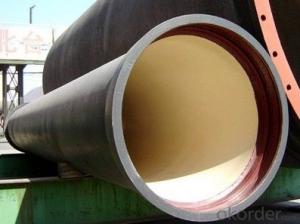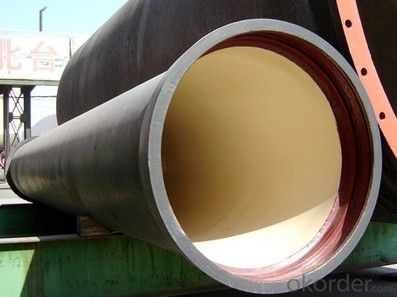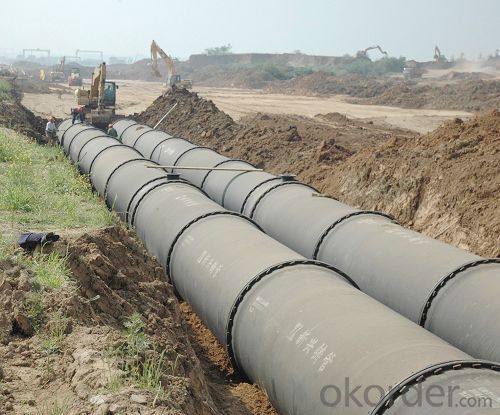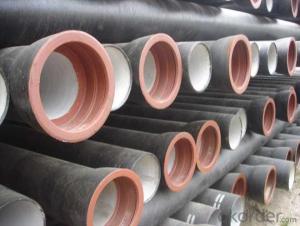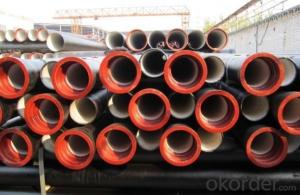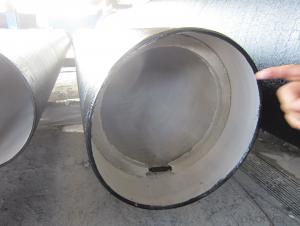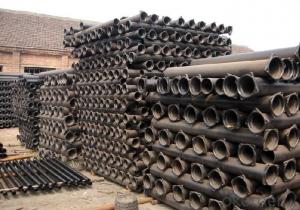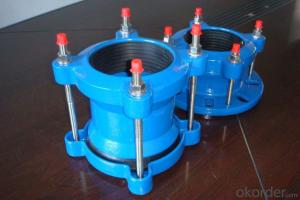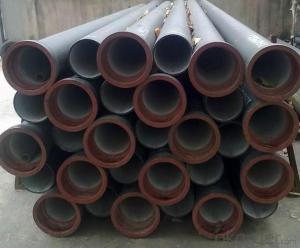Ductile Iron Cast Iron Pipe EN598 DN300 On Sale
- Loading Port:
- China main port
- Payment Terms:
- TT OR LC
- Min Order Qty:
- 999 m
- Supply Capability:
- 9999 m/month
OKorder Service Pledge
OKorder Financial Service
You Might Also Like
1,Ductile Iron Pipe Description :
1) Pipes confirm to ISO2531,K9 class,T type joint,6m long,with inside cements lining conform to ISO4179, outside Zinc spraying(130g/m2) and bitumen coating(70μm) conform to ISO8179.
2) Pipe ends: Spigot and socket ends, with 100% SBR rubber gaskets accoding to ISO4633
3) we can do third party inspection according to customer's request.
4) Our products have been sold to many international market, such as Middle East and South East Asia and Africa.
2,Main Features of the Ductile Iron Pipe:
•High yield strength
•High tensile Strength
•High corrosion resistance
•Pressure Resistence
Test: In accordance with ISO 2531 / EN 545 / EN598 and 100% water pressure test
Length: 6m or cut into 5.6m, 5.7m, 5.8m
Internal Lining: Cement, conform to ISO4179
External coating: Zinc + Bitumen, conform to ISO8179
Rubber: NBR, SBR, EPDM according to ISO4633 / EN681.1
Note: The gaskets, bolts & nuts are supplied respectively as your special requirement
3,Ductile Iron Pipe Images:
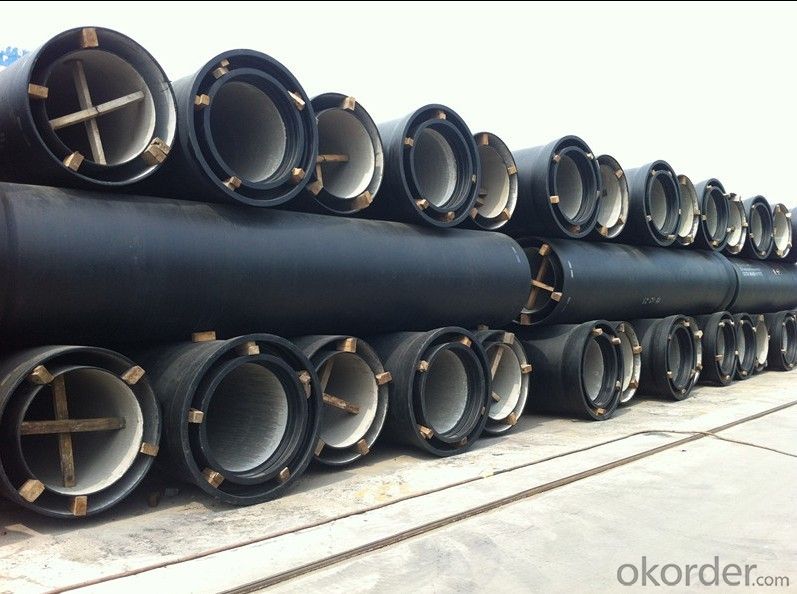
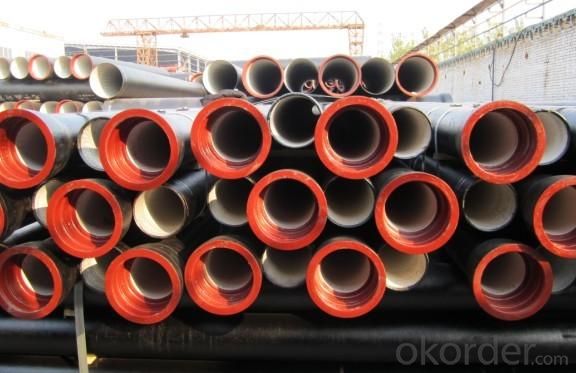
4. Ductile Iron Pipe Specification
Standard: API SPEC 5L 44th eidtion,ASTM A252-98(2007)
Grade: A53 Grades A/B, ASTM A106 Grades B/C,ASTM A179
AWWA, C200, ASTM A139, ASTM A120, API 5L Grade B
X42, X52, X56, X60, X65, X70, X80, X100
Weld Alternatives: LSAW
OD size range: 6.4~44.5mm
Wall thickness: 406.4~1422mm
Length: 3 - 12 m according to requirment
Note: Other grade can also be provided after consulting. Special design are available
for coal slurry conveyance LSAW line tube -- Service
Specifications
Subsidiary of Forbes Fortune 500 company (Ranking 485th in 2011). Provides full rang of ductile iron pipes with finest quality.
5.FAQ:
We have organized several common questions for our clients,may help you sincerely:
1.Q: Why would you choose ductile iron pipe rather than other pipe materials?
A:The reasons are obvious for that not only ductile iron pipe possesses the inherent strength and flexibility of ductile iron, combined with proven corrosion protection systems, but also the cost savings can be achieved from design to installation and commissioning.
2.Q:Why can you guarantee the inner of pipes can’t be corroded?
A: High alumina cement mortar lining and sulphate-resistant cement mortar lining. These two special linings are applicable to inner anti-corrosion for sewage pipes, improving resistance to erosion of the sewage components.
- Q: How are ductile iron pipes restrained against axial thrust forces?
- Ductile iron pipes are restrained against axial thrust forces through a combination of mechanical restraints and soil resistance. One common method of restraining axial thrust forces is by using thrust blocks. Thrust blocks are concrete structures that are built at bends, tees, and other locations where changes in direction occur in the pipeline. These blocks are designed to resist the axial forces and prevent the pipes from shifting or moving due to the pressure exerted by the flowing fluid. Additionally, mechanical restraints such as pipe restraints, thrust collars, and anchor blocks are used to provide further support and prevent axial movement. Pipe restraints are devices that are installed around the pipe and connected to adjacent structures, such as walls or concrete collars, to prevent movement. Thrust collars are also used to absorb and distribute the thrust forces generated by the flowing fluid. These collars are typically made of ductile iron or steel and are secured around the pipe to resist axial movement. Furthermore, soil resistance plays a significant role in restraining axial thrust forces. The weight of the soil surrounding the pipe creates frictional resistance, which helps counteract the axial forces. Proper trench backfilling, compaction, and adequate embedment of the pipe in the soil are essential to ensure effective soil resistance. In summary, ductile iron pipes are restrained against axial thrust forces through a combination of mechanical restraints such as thrust blocks, pipe restraints, and thrust collars, as well as soil resistance provided by proper trench backfilling and compaction. This comprehensive approach ensures that the pipes remain securely in place and can withstand the axial forces generated by the fluid flowing through them.
- Q: What is the composition of ductile iron pipes?
- Ductile iron pipes consist mainly of iron, with small amounts of carbon, silicon, and other alloying elements. The iron content typically ranges from 90% to 94%, while carbon content is usually around 3% to 4%. Silicon is added between 1.5% to 3%, which enhances the ductility and strength of the iron. Smaller quantities of manganese, sulfur, and phosphorus may also be present. The composition of ductile iron pipes is carefully engineered to achieve specific properties. By adding carbon and silicon, the hardness and strength of the iron are improved, making it suitable for demanding applications. These alloying elements also contribute to the pipes' ductility, allowing them to be easily bent and molded without breaking. In summary, the composition of ductile iron pipes is designed to strike a balance between strength, ductility, and resistance to corrosion. This makes them ideal for use in water and sewage systems, where they can endure high pressure, bear heavy loads, and resist the corrosive effects of water and other chemicals.
- Q: How does ductile iron pipe perform in areas with high soil contamination?
- Due to its inherent strength, durability, and corrosion resistance properties, ductile iron pipe is highly effective in areas with high soil contamination. The material used in manufacturing these pipes is highly resistant to chemical attack, making it suitable for handling various types of contaminated soils, including those with high levels of acids, alkalis, and other corrosive substances. The corrosion resistance of ductile iron pipes is primarily due to their protective internal and external linings. These linings are designed to prevent contact between the pipe material and the surrounding soil or fluids, acting as a barrier that prevents the penetration of corrosive elements and reduces the risk of pipe degradation or failure. Additionally, external coatings or cathodic protection systems can further enhance the resistance of ductile iron pipes to soil contamination, extending their service life. Compared to materials such as steel or concrete, ductile iron pipes offer significant advantages in areas with high soil contamination. Their high strength enables them to withstand external loads imposed by the contaminated soil, reducing the risk of structural failure or deformation. Furthermore, the inherent flexibility of ductile iron allows it to absorb ground movements or settlement without compromising its integrity, making it a reliable choice for areas prone to soil instability or shifting. Moreover, the smooth internal surface of ductile iron pipes minimizes friction and maintains efficient flow rates, even in the presence of contaminants. This is particularly important in areas with high soil contamination, where debris or sedimentation can accumulate and hinder fluid flow. The smooth bore of ductile iron pipes reduces the risk of clogging and ensures the continuous and reliable conveyance of fluids, even in challenging soil conditions. In conclusion, ductile iron pipe is an excellent choice for areas with high soil contamination. Its exceptional corrosion resistance, strength, flexibility, and smooth internal surface make it a reliable and durable solution for conveying fluids in these challenging environments.
- Q: Are ductile iron pipes resistant to external loads?
- Yes, ductile iron pipes are generally resistant to external loads. Ductile iron is a type of cast iron that has been treated with additives such as magnesium and cerium to make it more flexible and durable. This increased flexibility allows the pipes to withstand high levels of external pressure and stress without cracking or breaking. Ductile iron pipes are commonly used in applications where they are exposed to heavy loads, such as underground water distribution systems, sewer lines, and industrial pipelines. These pipes have been proven to have excellent resistance to external loads, making them a reliable choice for various infrastructure projects.
- Q: Can ductile iron pipe be used for chemical processing plant applications?
- Ductile iron pipe is indeed suitable for chemical processing plant applications. It is a type of cast iron that possesses enhanced properties, such as improved ductility and strength, enabling its use in various industrial settings, including chemical processing plants. Ductile iron pipes exhibit excellent corrosion resistance, can endure high temperatures and pressures, and can handle aggressive chemical substances. Moreover, they are easy to install and maintain, offering a cost-effective solution for chemical processing plants. Nonetheless, it is crucial to consider the specific requirements and conditions of the plant, and seek advice from specialists to ensure the suitability of the chosen piping materials for the particular chemical processes and substances involved.
- Q: How are ductile iron pipes tested for hydrostatic pressure?
- Ductile iron pipes are commonly used for water and wastewater applications due to their strength and durability. To ensure the quality and reliability of these pipes, they undergo hydrostatic pressure testing. Hydrostatic pressure testing involves subjecting the ductile iron pipes to internal pressure higher than their normal operating pressure. This is done to assess their ability to withstand the maximum pressure they are expected to encounter during their service life. The testing process typically begins with the selection of a sample set of pipes from a production batch or shipment. These samples are carefully prepared by removing any surface coatings or debris that could affect the accuracy of the test results. Next, the prepared samples are placed within a specially designed test rig or test line. The test rig is equipped with all the necessary connections, valves, and gauges to control and monitor the test conditions accurately. Once the samples are secured in the test rig, water or another suitable test fluid is slowly introduced into the pipes. The pressure is then gradually increased to a predetermined level, typically exceeding the expected operating pressure by a certain factor. This elevated pressure is maintained for a specified duration, usually for several hours, to assess the pipes' structural integrity and leak resistance. During the test, the pipes are closely monitored for any signs of leakage, deformation, or failure. Skilled technicians or engineers observe the pressure gauges and visually inspect the pipes for any visible defects or abnormalities. Additionally, automated systems may be employed to continuously record and analyze the pressure readings, ensuring accurate data collection. After the specified test duration, the pressure is gradually released, and the pipes are carefully inspected for any permanent deformation or residual stress. This inspection may involve visual examination, dimensional measurements, or even non-destructive testing techniques such as ultrasonic testing or magnetic particle inspection. The test results are then evaluated against the relevant industry standards or specifications to determine the pipes' compliance with safety and performance requirements. If the pipes pass the hydrostatic pressure test, they are deemed suitable for their intended application. However, if any issues or failures are identified, further investigation, analysis, or corrective actions may be necessary before the pipes can be approved for use. Overall, hydrostatic pressure testing plays a crucial role in ensuring the quality and reliability of ductile iron pipes. By subjecting these pipes to rigorous testing procedures, manufacturers can provide customers with pipes that meet the highest standards of safety and performance.
- Q: What is the expected sound transmission loss of ductile iron pipes?
- The sound transmission loss of ductile iron pipes can vary depending on factors like pipe thickness, diameter, and the surrounding environment. Generally, ductile iron pipes have good soundproofing properties because they are dense and heavy. They are designed to minimize noise transmission and vibration. Ductile iron pipes can significantly reduce noise transmission. The material's density and mass block sound waves and reduce their transmission. However, it is important to note that the sound transmission loss of ductile iron pipes may not be as high as other specialized soundproofing materials like acoustic insulation or double-wall piping systems. To accurately determine the expected sound transmission loss of ductile iron pipes in a specific application, it is recommended to consult the manufacturer's specifications or conduct acoustic tests following relevant standards like ASTM E90. These tests can provide precise data on the sound transmission loss values of ductile iron pipes under different conditions, ensuring proper noise control and acoustic performance in specific installations.
- Q: How are ductile iron pipes protected against external impact or loading?
- Ductile iron pipes are protected against external impact or loading through various methods and measures to ensure their durability and integrity. Some of the common ways in which ductile iron pipes are protected are: 1. Thickness and strength: Ductile iron pipes are designed with a sufficient wall thickness and high strength to withstand external loads and impacts. This ensures that the pipes can endure heavy loads and resist deformation or cracking. 2. Coatings: Ductile iron pipes are typically coated with protective layers to provide an additional barrier against external impact. These coatings can include cement mortar lining, polyethylene encasement, or epoxy coatings. These coatings not only offer impact resistance but also provide corrosion protection to the pipes. 3. Bedding and backfilling: Proper bedding and backfilling techniques are essential to protect ductile iron pipes from external loads. The pipes are correctly placed and surrounded by suitable materials like compacted granular bedding and backfill, which help distribute the external loads evenly and reduce the risk of pipe damage. 4. Trench design: The design of the trench in which the ductile iron pipes are installed is crucial for protecting them against external impact. The trench dimensions, slope stability, and proper compaction of the backfill are considered to minimize the chances of damage due to external loads. 5. Pipe layout and support: Proper pipe layout and support are vital to protect ductile iron pipes from external impact. Adequate support mechanisms like thrust blocks, pipe anchors, and pipe restraints are employed to absorb and distribute external loads, preventing any damage to the pipes. 6. Protective structures: In areas where there is a higher risk of external impact, additional protective structures are installed to safeguard the ductile iron pipes. These structures can include concrete encasements, bollards, or reinforced concrete slabs, which act as physical barriers against potential impacts. Overall, a combination of factors such as pipe strength, coatings, proper installation techniques, and support measures work together to ensure the protection of ductile iron pipes against external impact or loading. These measures enhance the longevity and reliability of the pipes, ensuring their efficient performance in various applications.
- Q: Which direction should the spigot of the K9 ductile iron pipe be installed?
- Ductile iron pipes mainly called centrifugal ductile iron pipe, it has the properties of nature, iron and steel, excellent corrosion resistance, good ductility, good sealing effect, simple installation, mainly for municipal, industrial and mining enterprises, water supply, gas, oil etc.. Water supply pipe is the first choice, with high cost performance.
- Q: How are ductile iron pipes protected against external damage?
- Ductile iron pipes are protected against external damage through a variety of methods. One common method is the application of a protective coating to the pipe's exterior surface. This coating acts as a barrier, shielding the pipe from corrosive elements in the surrounding environment. Additionally, ductile iron pipes can be encased in concrete or a protective sleeve to provide further protection against external damage, such as impact or abrasion. Regular inspections and maintenance are also essential to identify any potential issues and ensure the ongoing protection of ductile iron pipes.
Send your message to us
Ductile Iron Cast Iron Pipe EN598 DN300 On Sale
- Loading Port:
- China main port
- Payment Terms:
- TT OR LC
- Min Order Qty:
- 999 m
- Supply Capability:
- 9999 m/month
OKorder Service Pledge
OKorder Financial Service
Similar products
Hot products
Hot Searches
Related keywords
